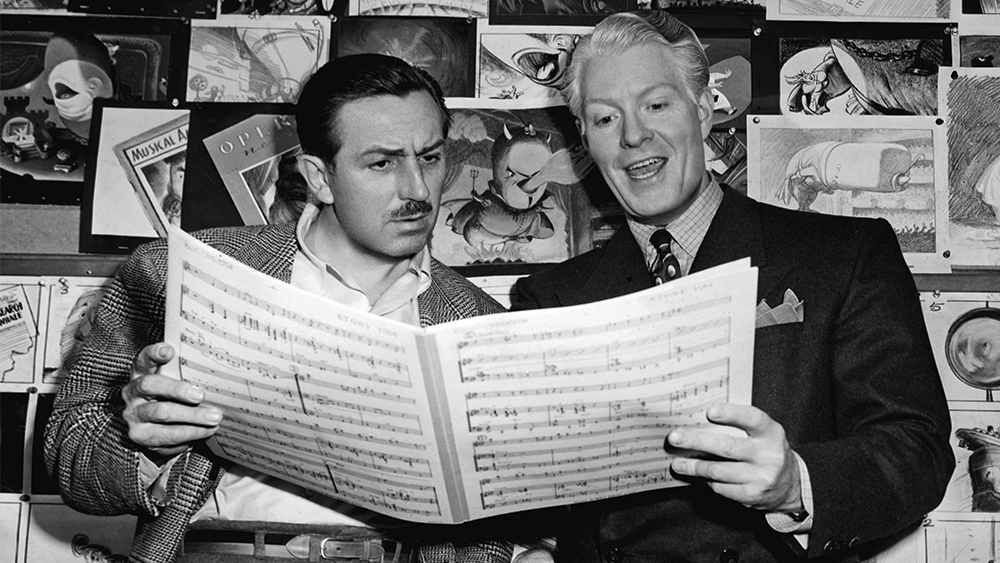When directors Dan Abraham and Trent Corey were preparing “Once Upon a Studio,” their animated tribute to 100 years of Disney animation, they knew they wanted two musical elements: Cliff Edwards, as Jiminy Cricket, singing “When You Wish Upon a Star,” and songwriter Richard Sherman playing piano for “Feed the Birds.”
Those two songs are emblematic of Walt Disney’s commitment to memorable, meaningful tunes as part of every Disney project dating back to the early Mickey Mouse days and the “Silly Symphonies” cartoon series. “When You Wish Upon a Star,” the Oscar-winning song from 1940’s “Pinocchio,” has become the studio’s unofficial musical signature, and “Feed the Birds,” from 1964’s “Mary Poppins,” was Disney’s personal favorite.
Over the years, Disney tunes have become an indelible part of popular culture. “Who’s Afraid of the Big Bad Wolf,” from 1933’s “The Three Little Pigs,” became an anthem for Americans determined to overcome the hardships of the Great Depression — as well as the first of the studio’s dozens of hit songs. (No other film studio boasts as many.)
Frank Churchill, who wrote “Big Bad Wolf” and went on to write the songs for 1937’s “Snow White and the Seven Dwarfs,” Disney’s first feature-length animated film, was just the first of many songwriters to call the Hyperion Avenue and Burbank studios home. His “Heigh-Ho” and “Someday My Prince Will Come,” as well as the poignant “Baby Mine” from 1941’s “Dumbo,” are classics from that early era of Disney animation.
Disney’s fascination with music didn’t stop with songs. His 1940 masterpiece “Fantasia,” the culmination of a three-year collaboration with conductor Leopold Stokowski, combined animation with classical music, including pieces by Bach, Tchaikovsky, Beethoven and Stravinsky (plus Mickey as “The Sorcerer’s Apprentice”). It ranks No. 5 on the American Film Institute’s list of all-time greatest animation films.
Along the way came other tunes that would prove popular: “A Dream Is a Wish Your Heart Makes” from 1950’s “Cinderella,” Peggy Lee’s sassy, jazzy touch with “He’s a Tramp” (from 1955’s “Lady and the Tramp”) and one of the most delightful villain songs ever, “Cruella de Vil” from 1961’s “One Hundred and One Dalmatians.”
Two songwriting duos revolutionized music-making at Disney. In 1960, brothers Richard and Robert Sherman were placed under contract (initially to write songs for Annette Funicello) and played a key role in the development of 1964’s “Mary Poppins,” including the Oscar-winning “Chim Chim Cher-ee,” “A Spoonful of Sugar” and Walt’s favorite, “Feed the Birds.” “Winnie the Pooh” (1966) and other songs followed from the Shermans.
Love Film & TV?
Get your daily dose of everything happening in music, film and TV in Australia and abroad.
The arrival of Broadway tunesmiths Howard Ashman and Alan Menken was equally significant. Their Oscar-winning song scores for 1989’s “The Little Mermaid” (including “Under the Sea”), 1991’s “Beauty and the Beast” (including “Be Our Guest”) and 1992’s “Aladdin” (including “Friend Like Me”) helped launch the Disney renaissance by solidly rooting stories and songs in a musical-theater foundation. After Ashman’s death, Menken continued with new lyricists, among them Stephen Schwartz for 1995’s “Pocahontas” (including “Colors of the Wind”) and 2007’s “Enchanted.”
Disney began signing pop stars to contribute songs, too, and the result was both creative and commercial success: Elton John for 1994’s “The Lion King” (including “Circle of Life”), Phil Collins for 1999’s “Tarzan” and Randy Newman for 2009’s “Princess and the Frog.”
“Let It Go” (from 2013’s “Frozen,” by Robert Lopez and Kristen Anderson-Lopez) became an Oscar-winning Disney megahit and 21st-century female-empowerment anthem. Lin-Manuel Miranda contributed songs to both 2016’s “Moana” and 2021’s “Encanto,” which generated a completely unexpected No. 1 hit in “We Don’t Talk About Bruno.”
Thanks to TikTok and other social media, “Bruno” became an internet sensation and, while it wasn’t even entered for Oscar consideration, did win a Grammy in 2023 and has chalked up over 500 million views on YouTube.
From Variety US































